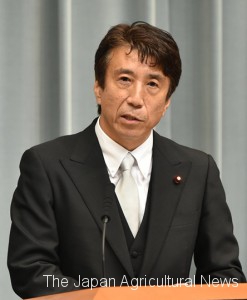
Agriculture Minister Ken Saito meets the press at the prime minister’s official residence in Tokyo, Japan, Aug. 3.
TOKYO, Aug. 4 — Japan Prime Minister Shinzo Abe has appointed a new cabinet at a time when his public approval ratings were tumbling due to accusations of cronyism and missteps by previous cabinet members.
Bringing some veteran lawmakers into the new cabinet, Abe dubbed it a “Result-oriented cabinet of professionals” at a press conference on Aug. 3.
Abe stressed his top priority is reviving the economy, and said: “Structural reform is the ultimate weapon of Abenomics.”
The Central Union of Agricultural Cooperatives, or JA-ZENCHU, has been a prime target of Abe’s structural changes. Chief Cabinet Secretary Yoshihide Suga, one of Abe’s most important allies, has been behind the entire overhauling of the agriculture sector.
As Suga remains in his post, one senior official was heard to remark, “It’s the cabinet office that will advance agriculture reform.”
The post of agriculture minister went to Ken Saito, a former official from the trade ministry. A choice such as Saito as a minister is rare because he has only been elected as an MP three times, about half the average for such high-profile posts in Japanese politics.
Saito served as the vice minister of agriculture in Abe’s second cabinet, facilitating consultations with the governing Liberal Democratic Party (LDP) to move agriculture reform forward.
For the post of foreign minister, Abe chose Taro Kono, one of the most liberal in the party. He will be the chief negotiator for the Japan-EU free trade agreement.
Abe also appointed Toshimitsu Motegi as the minister of economic vitalization, who is also in charge of the Trans-Pacific Partnership (TPP).
As widely expected, Deputy Prime Minister and Finance Minister Taro Aso retained his post. Aso is the counterpart of the U.S. Vice President Mike Pence at the Japan-U.S. Economic Dialogue, in which Washington has pressed Tokyo hard to enter a bilateral trade negotiation, after abandoning the TPP.
Trade Minister Hiroshige Seko also stays on.

